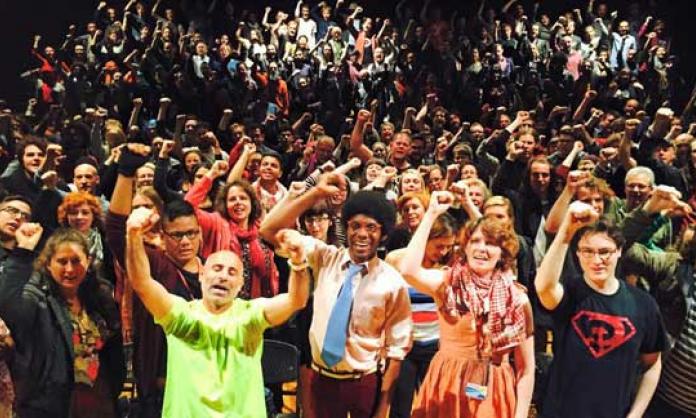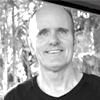“Socialists are involved in the same project all over the world – whether in Iraq, Australia or the US. Those who fight for revolution are tied together across borders and across time – both those who came before us and those who will come afterwards. Today is our time to carry the banner of socialism proudly. Here’s to revolution in our lifetime!”
With these words, US African-American activist and socialist Khury Petersen-Smith brought the Marxism 2015 conference to a close on Sunday night. The conference offered four days of inspiring talks, debates, songs, art exhibitions and movie screenings.
More than 900 people attended Australia’s premier left wing conference, held this year for the first time at the Victorian College of Arts.
Speakers and attendees came from around the world – from the Philippines and Indonesia, from the US and Russia, from Ireland and Palestine – and from around the country. Many brought stories of their involvement in struggles, some over the last few months and some over a lifetime.
Aboriginal activists Marjorie Thorpe, Gary Foley, Noel Tovey, Meriki Onus and Sam Watson told packed meetings about the struggle for Aboriginal rights. Marjorie Thorpe spoke about growing up in a strong union town in Victoria’s Latrobe Valley before joining the fight for black rights in Fitzroy in the 1970s. Gary Foley was back for the 5th year to speak to a sold-out audience about his involvement in promoting Aboriginal issues and identity through art, film and television.
Other highlights included Black Panther artist and former minister of culture Emory Douglas and renowned Aboriginal artist Richard Bell, who displayed a wide selection of art work. Emory was trained as a commercial artist, but with the rise of Black struggle in the 1960s quickly turned his talents to posters and artwork for the Black Panther newspaper, among other things popularising the use of the pig as a symbol for cops.
Irish socialist and civil rights activist Eamonn McCann has spent a lifetime fighting for justice for workers and the downtrodden. He emphasised the lines of continuity between the battles in the Bogside in Derry against right wing Protestant sectarianism in 1968 and the global revolt then unfolding:
“We saw what we did as part of an international struggle, and that’s why we associated with the Black Panthers and the Mexican students and the Prague Spring and with Paris. We sensed that these had something to do with us. We weren’t exceptional, nobody was exceptional, the whole world must rise up together. And for a while it seemed possible.
“Some things stay the same. None of us can be free until all of us are free, and that’s true for whatever struggle we’re fighting around – whether skin colour, sexuality, workers’ rights or the environment. That’s the case for revolutionary socialist politics as opposed to any other kind.”
That was why, Eamonn argued, even in the most heated struggles, “socialists must never forget the necessity of building a revolutionary party”.
Journalist Amira Hass related the experience of reporting on Israel’s repeated assaults on the Palestinian territories and the occupation more generally. In a separate session she spoke movingly about her mother, Hanna Lévy-Hass, who survived nine months in the Bergen-Belsen Nazi concentration camp during the Second World War.
US socialist Khury Petersen-Smith spoke of his radicalisation as a young man witnessing the brutalisation of African Americans, and said that the same resentment is brewing among another generation of young Blacks today. He said that last year’s Ferguson protests against police killings exploded due to “the rage accumulated over a generation of Black people who have grown up among state violence”.
The current #BlackLivesMatter campaign is “an opportunity to mobilise people, both Black and white, to shake the country to its core”.
“In the 1960s”, he said, “the civil rights movement drove a whole era of struggle but the system was able to survive. This time we want to take the fight all the way.”
US journalist Anand Gopal took apart Western hypocrisy regarding the Islamic State, explaining that the Shiite militias with whom Australia is now in a de facto alliance in Iraq are equally responsible for atrocities. The people of northern Iraq had repeatedly risen up in rebellion against the Maliki government in Baghdad in recent years but saw their struggles crushed with the connivance of the US.
Only once the non-sectarian and democratic mass movement had been driven underground did the Islamic State emerge. In Afghanistan, Anand explained, Western intervention has been similarly destructive, with Australia now training murderous militiamen and sending them back to Afghanistan to commit war crimes.
The conference didn’t just touch on the high points of struggle but also involved reports on the sometimes humdrum but essential work that many are involved in. Sometimes it is just a matter of recruiting the next person to the union and beginning the process of rebuilding working class strength.
At other times, much more is possible. The conference heard from union activists from a wide range of industries who spoke of their involvement in everything from lengthy strikes in the Pilbara iron ore industry to small actions involving a dozen non-union hospitality workers plucking up the courage to put a list of demands on the boss’s desk. One highlight was a talk by rank and file Electrical Trades Union activist Dave Hayes (“Strawbs”) who reported on the fight to organise FIFO workers.
And then there were the streams of talks on everything from the history of class struggle in Latin America and gender and sexuality to the basics of Marxism and the political history of things – sugar, cotton and tulips.
In the evenings, attendees were entertained by Perth folk band “Bad Practice” and musicians Janey Stone and Santo Cazzati, who presented a night of Berlin cabaret from the 1920s.
The Marxism conference left people refreshed and ready for the fight ahead. As Irish socialist Goretti Horgan put it on the closing night:
“Everywhere capitalism is in crisis and they want us to pay for it. Their profits are all that matters. But at this conference you can see a whole generation of young people getting together to overthrow the whole rotten system.”
Socialist Alternative and Red Flag, who hosted the conference, would like to thank everyone who participated and who made Marxism 2015 the vibrant and stimulating event that it was.
If you missed the conference but would like to listen to some of the talks, they will be uploaded to the Marxism conference website in coming weeks – marxismconference.org.
[Marxism 2016 will be held over the Easter weekend 24-27 March 2016. Check the Marxism conference website closer to the time for the program and more details.]





